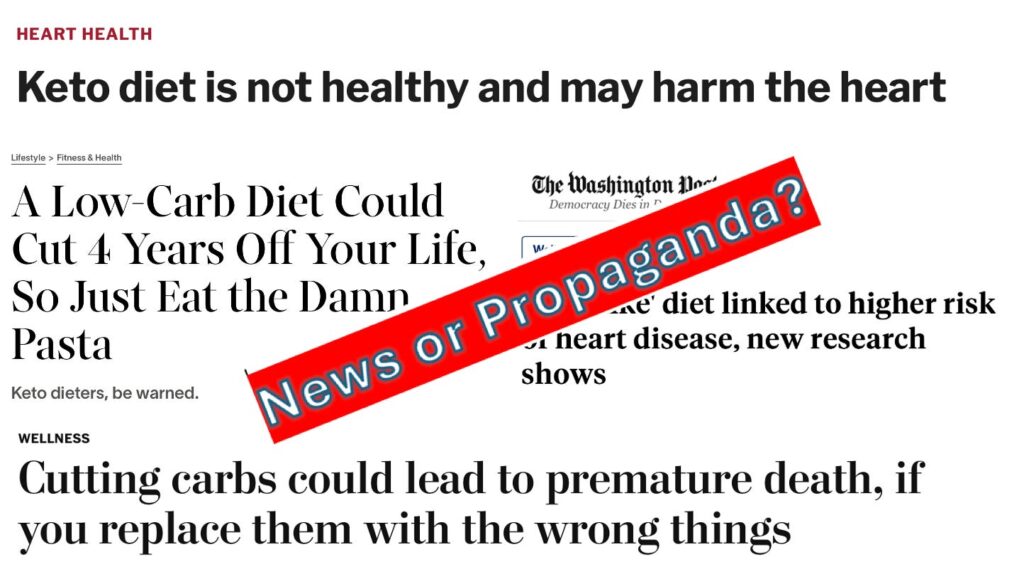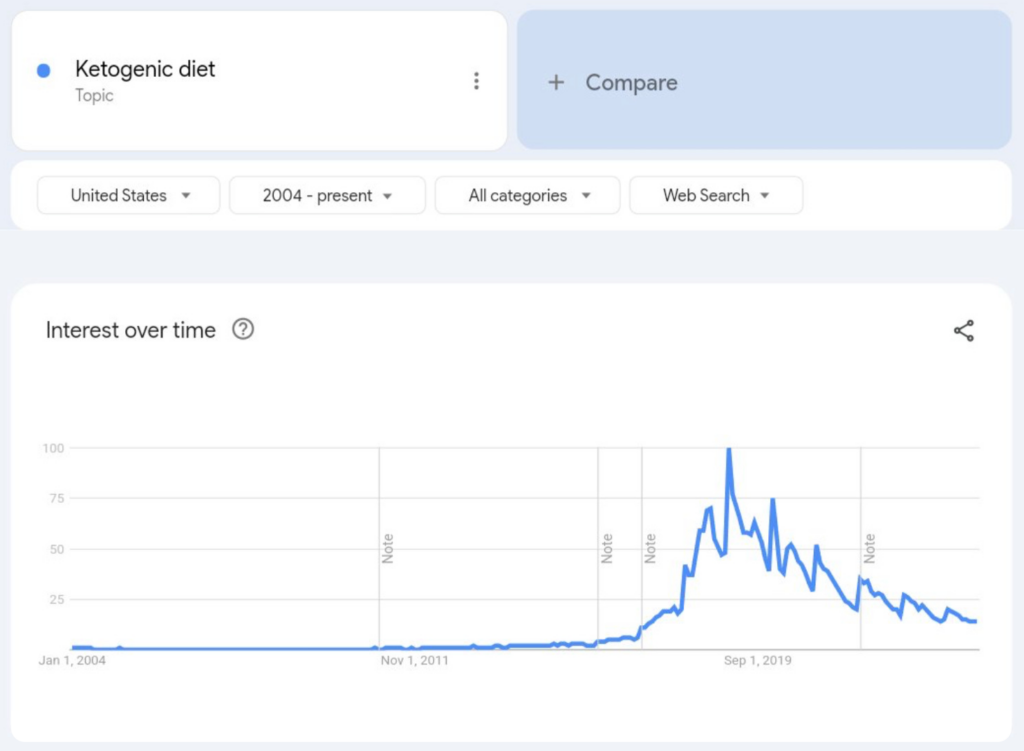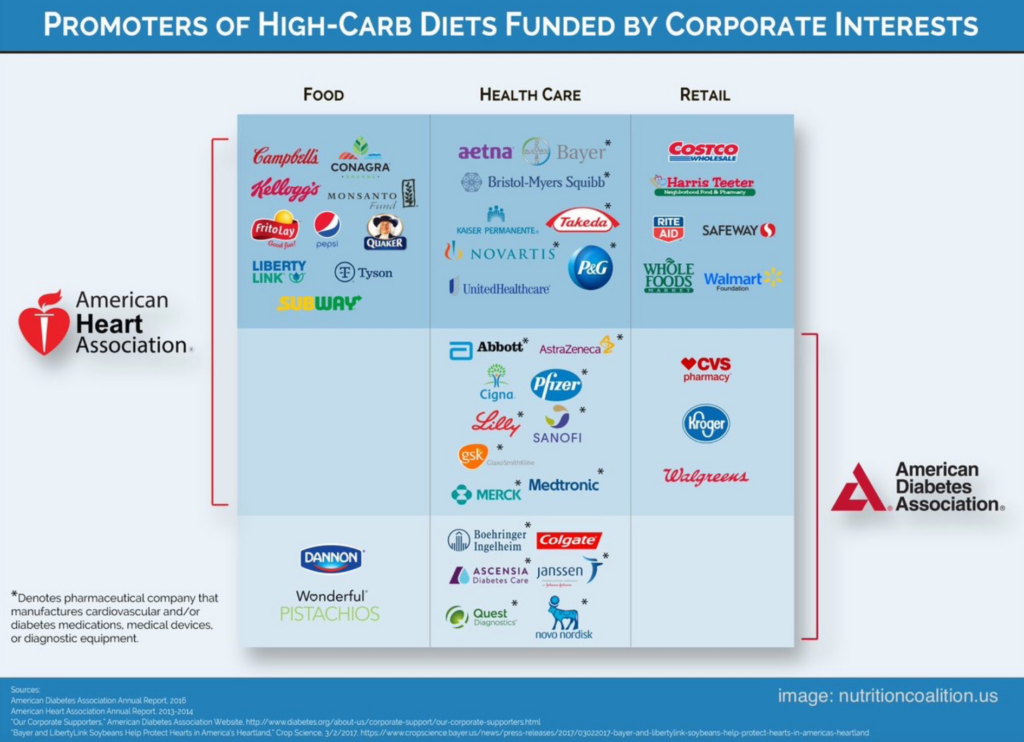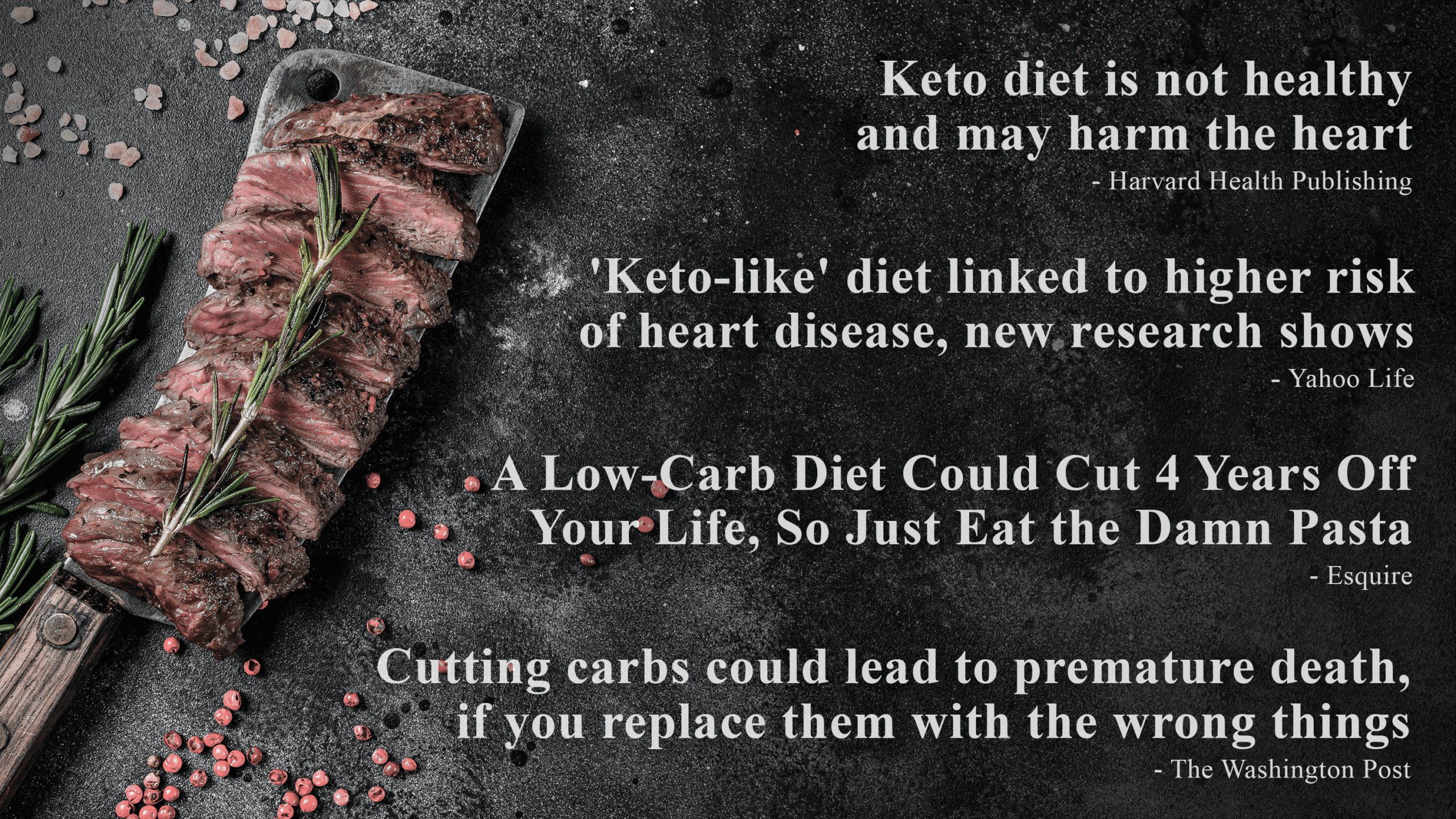Many of us challenging mainstream health advice find ourselves continually questioning whether the unending stream of inaccurate information from newspapers, academics, and experts is intentional or just ill-advised. The latter explanation would be a far more comforting idea, as it would imply a non-malevolent world where I’m guessing we’d all prefer to live. Yet, having spent two decades investigating diet and health, I’ve concluded that while there are many well-meaning experts out there, the forces suppressing good science and intentionally promoting misinformation—technically known as “disinformation”—are driving the narrative. Below are some examples.
I’ll focus on the low-carbohydrate diet, because it’s been shown to be so effective in reversing many chronic diseases, including type 2 diabetes, a cruel and costly affliction affecting an estimated 462 million people worldwide. Low-carb can be life-saving for these people. If it were a pill or a device backed by pharmaceutical interests, we’d have been reading about it daily, much as we do now with weight loss drugs like Wegovy. Instead, our top experts and the media have remained largely silent on low-carb.
There’s no question that these diets, because they reverse diseases, constitute a major threat to the pharmaceutical industry, which makes its money from people being sick. Chronic diseases that require lifelong medications are a particular sweet spot of revenue for this industry. Pharmaceutical companies spent north of $8 billion on media advertising last year (up from $6 billion in 2020), and their goal, cynical as it sounds, is to maximize their sales, not make us healthy enough to quit their products.
Low-carb diets, because they reverse disease, are also a threat to Big Food, whose ultra-processed foods are mostly derived from the very sugars and starches that low-carb diets avoid. I’ve written about how Unilever, Danone, Nestlé, the Coca-Cola Company, PepsiCo. and other processed food companies were found to dominate global food policy. Nestlé, Danone, General Mills, and Kellogg’s were also among the companies found to have direct ties with the expert group behind our current U.S. Dietary Guidelines for Americans. The entity with the most ties to these guidelines’ experts was the International Life Sciences Institute (ILSI), a multinational food industry lobbying group that was started by an ex-Coke vice president and whose members include many of the same familiar names: Unilever, Coke, PepsiCo, Kellogg’s, and General Mills.
How did that turn out for our food policies? As far as I know, low-carbohydrate diets have never been discussed at the global level (The “EAT-Lancet” diet, the forerunner for adoption by the United Nations, contains 50-55% of calories as carbohydrate, or roughly twice that of a low-carb diet).
As for the U.S. guidelines, I found that the lead agency on this policy, the U.S. Department of Agriculture, suppressed information on these diets and in 2020, claimed that no trials on them had ever been conducted—when already hundreds had been published, including one by a member of the guidelines’ expert group itself.
While authorities seem intent on ignoring the diet’s very existence, we see in parallel a continual drumbeat of headlines warning us of its ill effects, and not just minor ones. If you do a Google search for low-carbohydrate and “premature death,” or “all-cause mortality,” or “mortality,” you’ll turn up endless pages of headlines. Some of them are truly terrifying, such as “Low Carb Diets Have Been Linked to an Early Death: Keto lovers, beware” (Men’s Health), “Cutting carbs could lead to premature death” (Washington Post), and “A Low-Carb Diet Could Cut 4 Years Off Your Life, So Just Eat the Damn Pasta” (Esquire). Many others warn of heart disease: “Keto diet is not healthy and may harm the heart (Harvard Health), and “’Keto-like’ diet linked to higher risk of heart disease” (ABC News).

How can we explain this proliferation of anti-low-carb headlines while not a single U.S. news agency will report on the diet’s benefits for diabetes? Industry involvement in both nutrition science and the media is pervasive and undeniable. Also undeniable is that most of the studies generating these headlines are based on the flimsiest of evidence—or simply no evidence at all. If the aim is to use weak science to garner scary news headlines that scare people off keto, then mission accomplished. As the master propagandist Joseph Goebbels taught us, a lie repeated often enough becomes the truth.

The first example comes this week from Australia, where headlines, including one on the front page of the Sydney Morning Herald, trumpeted that low-carbohydrate eating causes diabetes. Just on its face, the idea that a diet could cause a disorder it has been shown, in multiple clinical trials, to reverse is absurd. If the peer reviewers for the journal had been doing their job, the paper covered by these news reports would never have been published.
To review the study briefly: researchers from the Royal Melbourne Institute of Technology and Monash Universities, both in Australia, analyzed data collected 16 years ago on 41,513 Melbourne residents. The subjects who self-reported having diabetes also had significantly lower physical activity, higher rates of smoking, a lower socio-economic status, higher BMI (body mass index), higher abdominal obesity, higher likelihood of a family history of diabetes, and a lower “healthy eating” score (reflecting an overall poor diet). So, these folks were not healthy in many ways. Researchers try to “adjust” for all these factors, but they can’t, effectively (For instance, imagine trying to adjust accurately for the impact of the “healthy eating” index, which itself has nine components.)
In the end, the authors found only a 3% difference in the risk for diabetes between low- and high-carb eaters. This is a minuscule, meaningless difference. And don’t forget that this tiny number is contradicted by far more rigorous data from clinical trials showing that a very low-carb diet resolves the disease.
The kicker in this study was that the so-called low-carbohydrate group was not even low-carb. Although a single definition of “low-carbohydrate” is elusive, experts actively conducting trials on this diet have generally agreed to define it as one where carbohydrates are kept below 130 grams daily. That’s about 30% of calories for an average 2,000-calorie/day diet. Twenty-five percent (25%) was the definition used by the expert group reviewing the science of this diet for the 2020 Dietary Guidelines.
By contrast, the Australian team used 37.5%, a definition created by researchers at the Harvard T.S. Chan School of Public Health. Harvard is prestigious, true, yet Walter Willett, its leader of 25 years (1991-2017), was driven by a strong bias for a vegetarian diet with carbohydrate-rich foods such as whole grains, nuts and seeds (which the school continues to promote). Low-carb is very different—the competition, if you will– and Harvard’s view of it has mostly been wary to critical. Also, the school itself conducts no clinical trials on the diet, so its researchers have no direct experience with how it works. These factors make Harvard a less-than-authoritative source for defining low-carb.
Even so, the same or similarly non-standard definitions have been used in many other observational studies, also generating frightening news reports. For a 2021 paper in Nutrients on which I was a co-author with 11 low-carb researchers, I examined all the papers that linked low-carb to increased mortality (dying early). In the nine papers I identified, “low-carbohydrate” was defined as follows (country of study follows in parentheses): 53% (Japan), 40% (Sweden), 40.9% (United Kingdom). 37%, 39%, 47.3%, 40%, 37.2%, and 43.2% (United States). So, not low-carb.
Some of these studies led to those headlines about how low-carb kills, and a reasonable readers would be scared off. They would have no idea that more rigorous clinical trial evidence had established low-carbohydrate diets as highly effective for treating not just diabetes but also hypertension, the vast majority of heart disease risk factors, and even, potentially, cancer. Since these chronic diseases are responsible for most deaths in America, how could a diet that ameliorates such conditions end up ushering in our early demise? It’s a paradox— and one that the authors of the papers listed above make little or no attempt to reconcile.
The following two examples of weak (or no) science being catapulted into worldwide headlines come from the American Heart Association (AHA) and the American College of Cardiology (ACC). These groups reported receiving 20% (in 2014) and 38% (in 2012) of their funding from industry, respectively.

The story from the ACC started with a press release by the group last year, stating, “Low-Carbohydrate High-Fat ‘Keto-Like’ Diet Associated With Increased Risk of CVD [cardiovascular disease].” This led to stories in CNN.com, GoodMorningAmerica.com, Salon, Fortune, Fox.com, Medscape, WebMD, Medical News Today, and other 20+ outlets, as I reported at the time. The news reflected data not from a published study or even a study abstract. It was crafted from results presented by a Canadian researcher with no experience in studying low-carb, speaking at an ACC conference. No slides of her talk were provided.
While the chilling news spread worldwide, the study was not published until fully a year later.
Science is not supposed to work this way. A press release should only come out when a study is published so that people can examine the data and form their own opinions. Press releases may be issued based solely on abstracts or poster presentations. That’s not ideal, but a press release with zero backup materials was breaking new ground. In this case, no independent analysis was possible. The satirist Johnathan Swift is said to have originated the phrase, “A lie can travel halfway around the world while the truth is still putting on its shoes.” But if the truth can’t even put on its shoes for a full year, the lie has long since solidified.
When the study was finally published in March of this year in the Journal of the American College of Cardiology (ACC’s journal), a detailed analysis by Zoe Harcombe, PhD, found that of the 500,000 participants in the study, the paper’s claim was based on only 305 people who tried to remember what they ate the day before sometime between April 2009 to September 2010. Those 305 people forgot approximately a quarter of their caloric intake.
That should be enough to dismiss the study. Yet Harcombe further found that the 305-person low-carb group was “three times more likely to have diabetes, far more likely to be obese and to have a higher BMI.” Harcombe noted that the paper did not present any model that adjusted for all baseline differences.
The AHA gives us our final example of apparent disinformation. Last year, it issued a scientific statement that generated headlines such as “Popular keto and paleo diets aren’t helping your heart” (Washington Post). As I wrote at the time, a reader would think that the paper examined the heart disease outcomes of these diets, but in fact, it did not.
Instead, the paper compared how closely different diets aligned with the AHA’s own diet plan. The AHA asked, in essence: Are you like us? By this standard, the #1 diet on their list was DASH (Dietary Alternatives to Stop Hypertension), because…that’s the AHA’s own diet!
The AHA report was, in effect, a self-affirmation exercise, a purity test. Headlines should have read: The AHA prefers its own diet and disapproves of others. (Worth noting: In a head-to-head diet trial, a very low-carb diet showed greater improvements in systolic blood pressure, glycemic control, and weight, compared to DASH).
All this negative news—and so much more—must be viewed in the context of the firm reality that if you search the government’s PubMed database of medical studies for clinical trials on low-carbohydrate diets, you’ll come up with more than 1,800 hits. That’s a spectacular number. By contrast, the much-heralded Mediterranean diet yields 1,647 results. Clinical trials provide the most rigorous, reliable evidence, and these trials consistently conclude that low-carb diets induce significant improvements in virtually every disease condition tested. (We can debate the LDL-cholesterol effects of low-carb; see the footnote for the latest data on this controversy.1)
Low-carb diets threaten food and pharmaceutical companies, Big Ag, fake-food companies, the entire medical establishment, and clinicians who’ve been telling us for decades to eat high-carb diets (as have most journalists who echo that view). The entire scaffolding of interests and business models is weakened if not toppled if the public widely adopts low-carbohydrate diets. There’s also a longstanding bias against the diet, as I described last week, but to my mind, that bias doesn’t explain the magnitude and consistency of the public-relations effort invested in bashing this nutritional approach. A more compelling explanation is that we’ve been witnessing a well-fueled propaganda war for some time now.
Footnotes:
Physicians still fear that the diet’s saturated fat content will increase a person’s risk for heart-disease by raising LDL-cholesterol. Yet a large clinical trial found at one year that of the 20 heart disease risk factors measured, fully 17 showed significant improvements while two remained unchanged (LDL-P and ApoB). LDL-C was the outlier—the sole risk factor that worsened. (Overall, the 10-year atherosclerotic cardiovascular disease (ASCVD) risk score for these subjects decreased by − 11.9%.). Even the notion that LDL cholesterol is a meaningful heart-disease risk factor for people on low-carbohydrate diets has now been challenged. A recent meta-analysis of 41 low-carb diet trials concluded that only lean people (BMI<25) see this type of cholesterol go up. Further, a recent study in the Journal of the American College of Cardiology (JACC) found that these slim outliers, despite their increased LDL-C, had no significant plaque build-up after 4.7 years, compared to a matched control group. The JACC study suggests that elevated LDL cholesterol on low-carb is simply not meaningful in terms of observable heart disease.
Published originally on Nina Teicholz’s Substack, Unsettled Science, this article is republished here with the author’s permission.
Science journalist and author. PhD in nutrition, with a focus on evidence-based nutrition policy.
Support the Broken Science Initiative.
Subscribe today →
6 Comments
Leave A Comment
You must be logged in to post a comment.
recent posts
The iceberg beneath “normal” blood sugar numbers
What Addiction Medicine Missed – and What Bitten Jonsson’s Work Reveals




Thanks Nina,
Just read your book recently and now when I see an article with your name as author, I’m like a moth to the flame! From my perch, it looks like there are more players involved than just commercial corporate interest hyperfocused on maintaining the status quo of profit generation, social status and political power. Very curious to see if, or how they spin the recent findings by Powner and Jeffery that light stimulation of mitochondria reduces blood glucose levels! (J. Biophotonics 2024, 17(5), 32023400521.) Would you like a NIR Lamp with your Coke and a smile?
Thank you for sharing this article.
“I was just doing my job” is not valid for all the employees of Unilever, Danone, Nestlé, the Coca-Cola Company, PepsiCo, General Mills, Kellogg’s, AHA, ADA, Pfizer, Moderna, J&J, etc.
I missed this at first. Wow eye opening! I’m going to talk this!
💯 I am living breathing proof of this.
13 years ago, I flipped all my cholesterol numbers upside down and lost 60 lbs on a truly low carb, low saturated fat diet per the recommendation of my CrossFit coach at CrossFit West Houston.
At the time, I couldn’t get life insurance, my skin was riddled with acne and my doctor wanted me on beta blockers and cholesterol meds.
My physician never asked me to adjust my diet or exercise.
After changing my diet and building lean muscle mass, I have held steady around 18% body fat for over a decade.
I’m now 49 years old with clear skin, no medication and can kick just about everyone’s ass in the gym.
For the record, my insurance company couldn’t believe how drastically my cholesterol and triglyceride numbers had flipped in less than 6 months. So much so that I was required to retest my labs 4 times, because ‘the lab must be in error,’ before being approved for life insurance.
If I’m being fully transparent, I could hardly believe the switch myself…despite transitioning from a size 18 to a size 4.
I’m so grateful for this movement and Greg’s work. It literally saved my life.
I’m forever grateful. Thank you.
Thank you for sharing your amazing story! So glad you’re in the MetFix community :)